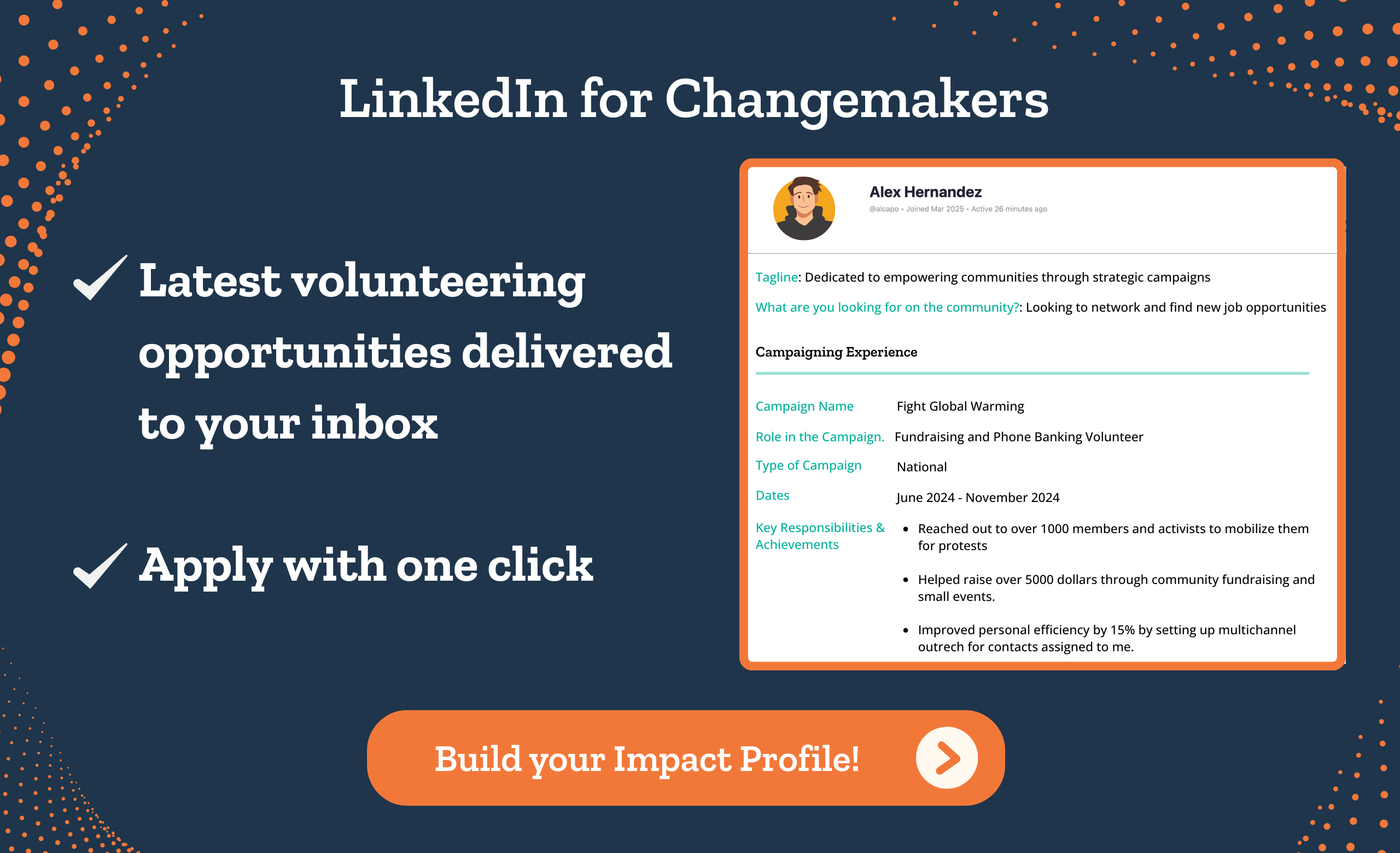Table of Contents
In our post on the donor management process, we spoke about developing an efficient process that can significantly boost your fundraising ROI. However, when this happens, you’re going to need additional resources to help you keep up with this continual growth. One such important information that you will absolutely need is a donor management CRM.
A donor management CRM will help you:
- Collect donor data in an efficient way, leaving no room for error due to manual data entry.
- Store the data in an organized manner, making it easy for you to analyze and get actionable insights.
- Remind you about routine tasks (and even automate some of them) like sending out newsletters, follow-ups to previous communications, etc., so you can focus on what’s important.
However, selecting the best nonprofit CRMs is not as simple. A quick online search will present you with a thousand options, therefore, making it difficult to select one that fits best.
To help you avoid that hassle, we’ll go over some key features to look for when selecting a donor management CRM, along with some recommendations to get started.
What is a Donor Management System?
A donor management system (DMS) is a tool primarily used by nonprofits to help them manage donor relationships. It helps organizations collect and manage donor data and use that data to get relevant insights.
These insights expose donor behaviors and patterns that are then used to inform their fundraising strategies, engagement efforts, and donor retention strategies.
For example, you know that donors who donate frequently deeply relate to the cause, which means you’ll need to engage them in more ways (like volunteering or leading/running peer-to-peer fundraisers) to keep them loyal to your organization.
To think of it in simpler terms, a DMS is like a large filing cabinet with files on each donor containing a range of information. The only difference is that, in this case, the cabinet is stored in the cloud.
Is a donor management CRM different from a normal CRM?
When scouting for a donor management system (or a donor management CRM), you may come across a number of sites talking about a nonprofit CRM instead of a DMS. Before you make a decision, it is important to understand the difference between the two.
A Constituent Relationship Management system is a software database that stores and tracks all of your organization’s data, including donor data, communication flows, campaign data, etc. A DMS strictly focuses on donor data.
Therefore, a bestnonprofit CRMs fundraising software is nothing but a subcategory of nonprofit CRM.
Typically, a nonprofit CRM can do everything that a donor management system does but has more bells and whistles. This is why a comprehensive CRM is also costlier than a DMS.
This brings up the question: Should you go for a nonprofit CRM or a nonprofit CRM software?
That depends on three things:
- The size of your organization: For organizations with large team and a lot of departments, a nonprofit CRM is a better tool. It automates most of the donor management processes and also syncs data coming in from different team members.
- Your needs: In case you need a tool to help you manage additional aspects like fundraising events, volunteers, internal communications, etc., a nonprofit CRM would be helpful. But, if strengthening donor relations is your key requirement, a DMS is a better choice.
- Budget: nonprofit CRMs bring in a number of additional functionalities and hence cost more. If you’re on a tight budget, a donor management system would be recommended as it will help you manage the most important asset of your organization: your donors.
Key features to look for in a donor management CRM.
Once you’ve decided that a DMS is what you need (and not a CRM), the next step is to narrow down your choices. You can do that by looking for solutions with the following key features that are absolutely essential for developing an efficient donor management process.
1. Donor profiles
The DMS should allow you to create comprehensive constant contact records for each donor. These profiles should include the donor’s
- Constant contact details
- Giving history
- Communication history
- Details on any other interactions they might have had with your nonprofit.
This profile should be updated in real-time with each new systeminteraction and incoming data.
2. Donation tracking
Donor management CRMs should also help you track donors who have committed to making a gift. While it could be included in the donor profile, having a separate segment for this would make follow-ups easier. You wouldn’t have to run filters on your database each time you want to track this.
3. Donor accounts
The donor management CRM should enable each donor to create an account of their own on your website. Give donors the ability to view and manage their giving history, recurring onlinedonations, tax receipts, etc.
4. List segmentation
You should be able to segment and create separate donor groups based on certain filters. For example, a group of lapsed donors who gave last year but not this year. This makes it easy to personalize all nonprofit communication.
5. Automate routine tasks
There’ll be quite a few routine tasks like sending out newsletters, follow-ups, etc. Your DMS should allow you to automate them. For tasks that cannot be automated workflows, you should be able to set reminders.
6. Track donor relationships
Another defining feature of a good DMS is the ability to track donor relationships among the donors in your database. For example, people working in the same company or those living in the same neighborhood. This can help you with personalization and reduce the effort of analyzing all your data manually to look for such relationships.
Apart from that, it should also enable you to automatically find duplicate records and merge them to keep the list clean.
7. Database backup
The DMS should run regular data backups to ensure that you don’t lose any data. Moreover, it should also allow you to import this data to an offline source if needed.
8. Integrations with useful management tools
Finally, you may be using third-party management tools, like a call center software for telephone fundraising. The donor management system should be able to integrate with it to allow a seamless flow of data.
There may be additional features that you may want based on your specific needs. However, these features are an absolute must for you to carry out most of your donor relation efforts.
5 questions to answer before selecting a fundraising CRM
Selecting the right fundraising Customer Relationship Management (CRM) system is crucial for effectively managing donor relationships and advancing your nonprofit’s mission. To ensure you choose a CRM that aligns with your organization’s needs, consider the following questions:
1. What are our organization’s primary goals and objectives?
- Define your mission and specific priorities to identify CRM features that support these goals.
2. Who will be using the CRM within our organization?
- Determine the roles of potential users (e.g., fundraisers, volunteer management, executives) to ensure the CRM meets their specific needs.
3. What is the current state of our data?
- Assess the quality, sources, and volume of your existing data to understand migration requirements and data management needs.
4. How many constituent records do we have, and what types of data do we need to store?
- Evaluate the scale and diversity of your data to ensure the CRM can accommodate and organize it effectively.
5. What are our most important upcoming initiatives?
- Identify upcoming email campaigns or events to determine if the CRM offers necessary functionalities likedirect mail marketing automation or event management.
By thoughtfully addressing these questions, you can identify a CRM system that not only meets your current requirements but also supports your nonprofit’s growth and evolving needs.
Donor management CRMs you can consider
Here’s a list of donor management systems that we recommend to help you narrow your search.
1. Bloomerang as a donor management CRM
Bloomerang is a nonprofit donor management software that was designed with nonprofit fundraising in mind. This all-in-one solution takes care of your donor management and fundraising needs through one platform.
Apart from robust donor profiles, the solution’s ability to track supporters through every stage of engagement with features like constituent timeline, social listening, website integrations, etc., comes in handy.
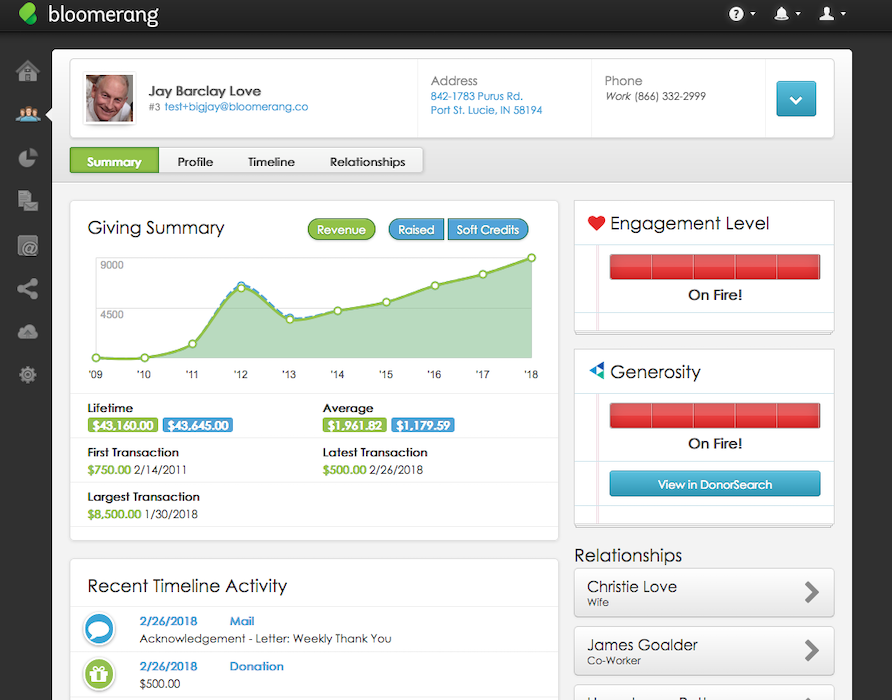
Pricing
- Bloomerang’s pricing starts at $125/month, with annual billing at $1,500. Pricing scales with the number of records you manage, and all plans include unlimited users.
2. DonorPerfect as a donor management CRM
DonorPerfect is a donor management system with intuitive navigation for the donor database. It lets you customize donor profiles as per your needs, making it easy for you to collate the data.

Source: Donorperfect
DonorPerfect’s notable feature is its free mobile app that gives you access to the entire system. You can add and manage all your data on the go from your cell phone itself.
Pricing
- DonorPerfect offers fundraising software packages starting at $99 per month, with pricing tailored to your organization’s needs. Contact their sales team to request a custom price quote
3. Little Green Light as donor management CRM
Little Green Light is a completely cloud-hosted donor management solution that makes it easy to integrate with any other software like call center software or email automation tools. This, in turn, makes it easy to keep track of all donor communications and the data collected during these interactions, for example, a phone survey conducted using your calling tool.
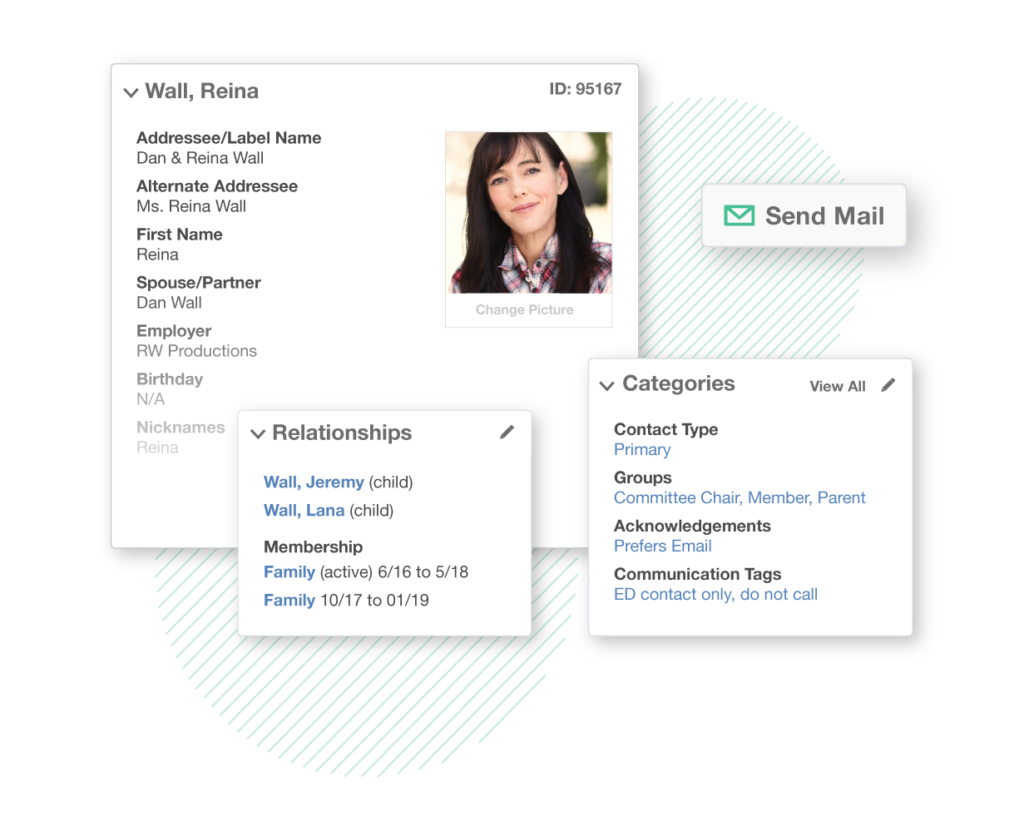
Source: Little Green Light
Pricing
- Upto 2,500 records: $45/month
- Handle upto 5,000 records: $60/month
- Upto 10,000 records: $75/month
- For upto 20,000 records: $90/month
The solution also offers annual plans at a 10% discount.
4. SignUpGenius
SignUpGenius is a comprehensive software solution that offers a dedicated donor management system under the name of NonprofitEasy.
This solution is suitable for nonprofits of all sizes. With this tool, your organization can manage all types of supporters, including volunteers, members, event participants, etc.
It comes with nearly 200 ready-made reports that you can use to analyze donor data. You can also create custom reports as per your needs.

Source: SignUpGenius
Pricing
SignUpGenius offers several premium plans to suit different organizing needs:
- Silver: $8.99 per month (billed annually at $107.89)
- Gold: $22.49 per month (billed annually at $269.89)
- Platinum: $44.99 per month (billed annually at $539.89)
- Enterprise: Custom pricing tailored to organizational requirements
They offer a 30-day free trial to let you see if it’s the right fit for you.
5. Arreva as donor management CRM
Arreva is an easy-to-use donor management CRM that lets you view all donor data in one centralized location. You won’t even have to leave the page to view it.
It easily integrates with all of your nonprofit marketing software and can generate insightful reports in one click. Another notable feature of this Donor Management CRM is that you can set reminders for specific actions for each donor if needed.
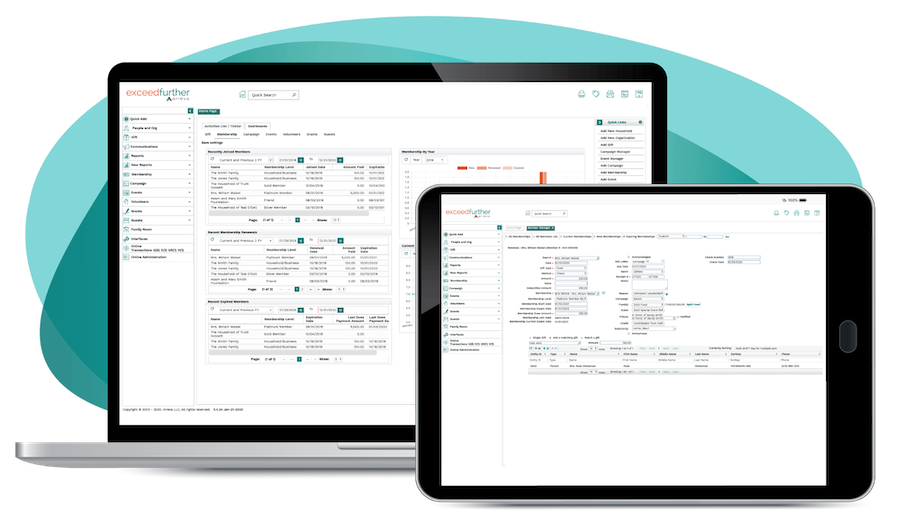
Pricing
Arreva’s pricing starts at $125 per month for the Team Fundraising software. For detailed pricing, contact Arreva directly. To know more about their pricing, you can schedule a demo or speak to their support staff to get the best package based on your requirements.
6. Kindful
Kindful is a comprehensive donor management CRM that lets you track, analyze, and report various aspects of the donor lifecycle. They also offer fundraising platform and other integrations to carry out a multitude of functions from one platform.
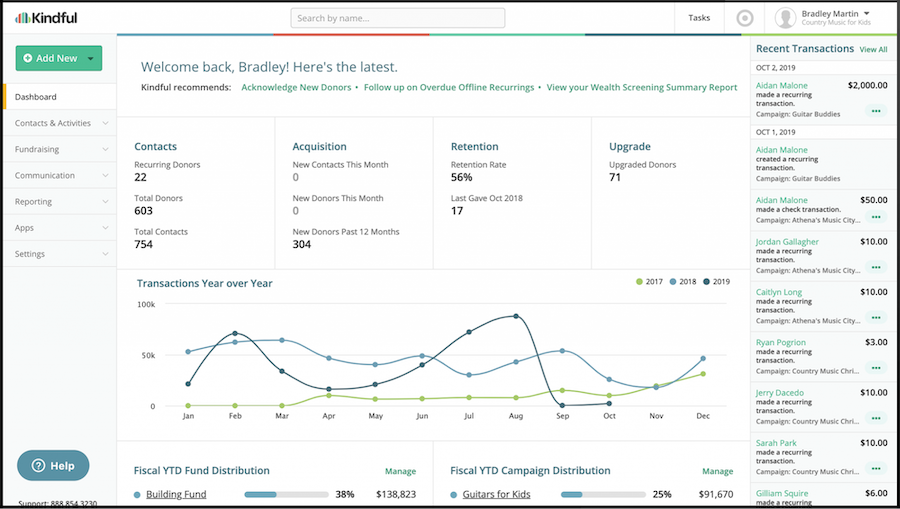
Pricing
- Kindful’s pricing starts at $99 per month, with additional Success Packages ranging from $33 to $359 per month, offering various levels of support and services. Schedule a demo to know more.
Having a donor management CRM in place can give your fundraising efforts the boost that you need. This, in turn, translates to exponential growth for your organization.
This would mean that you would also need a good CRM to support your donor management system and other efforts. At the risk of sounding blunt, we have to say that you’ll be faced with the same challenge of having a number of options to choose from. Our post on the Best CRMs for nonprofits can help you narrow down your choices and choose the solution that fits you best.
Featured image source: Mart Production

